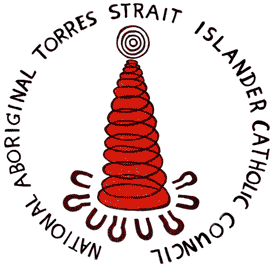
National Aboriginal and Torres Strait Islander Catholic Council
ABORIGINAL AND TORRES STRAIT ISLANDER CATHOLIC VOICES ON ...........
The Catholic Social Justice Principle of Subsidiarity teaches us that all people have the right to participate in decisions that affect their lives.
Subsidiarity requires that decisions be made by the people closest and most affected by the issues and concerns of the community. Your support of our voices on important issues helps to make Subsidiarity a reality. It is important to note that Aboriginal and Torres Strait Islander people are made up of a diversity of Language Groups and each possesses unique experiences and points of view. Please take the time to talk with your Traditional Custodians.
New paths for our Church
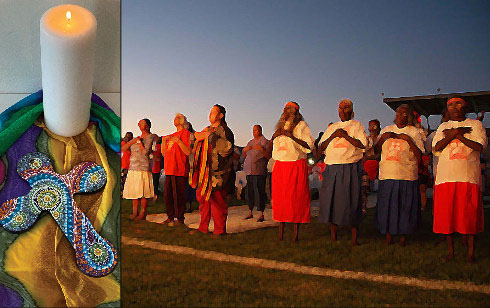 In 2020, Pope Francis published an apostolic exhortation in response to the Synod on the Amazon. In many ways, Querida Amazonia is a successor to Laudato Si’, drawing on its concern for creation and the marginalised to provide a specific focus on the struggles of indigenous peoples faced with environmental exploitation and displacement from their traditional homelands. The document speaks not just to the situation in the Amazon, but to all countries with indigenous peoples.
In 2020, Pope Francis published an apostolic exhortation in response to the Synod on the Amazon. In many ways, Querida Amazonia is a successor to Laudato Si’, drawing on its concern for creation and the marginalised to provide a specific focus on the struggles of indigenous peoples faced with environmental exploitation and displacement from their traditional homelands. The document speaks not just to the situation in the Amazon, but to all countries with indigenous peoples.
We asked members of the National Aboriginal and Torres Strait Islander Catholic Council to reflect on what these two landmark documents mean to them.
Respect for Aboriginal and Torres Strait Islander culture has been a constant refrain from recent popes. In his 1970 visit, Paul VI described it as a precious ‘ethnic genius’.
St John Paul II went further in 1986, telling Aboriginal and Torres Strait Islander people welcoming him at Alice Springs that ‘the Church in Australia will not be fully the Church that Jesus wants until you have made your contribution to her life and until that contribution has been joyfully received.’
More recently, Pope Francis’ 2015 encyclical Laudato Si’ has a deep respect for indigenous people and their culture. The pope highlights the need to learn and draw from indigenous views of the world in which we all live:
‘It is essential to show special care for indigenous communities and their cultural traditions. For them, land is not a commodity but a gift from God and from their ancestors who rest there, a sacred space with which they need to interact if they are to maintain their identity and values.’ (Laudato Si’, para 146)
The recent synod in Rome explored the issues raised in Laudato Si’ in relation to indigenous communities in the Amazon region, resulting in an apostolic exhortation, Querida Amazonia. While the exhortation focuses on the Amazon in particular, Australian Archbishop Mark Coleridge has noted that the issues it considers are ‘not foreign to Australia’, but will spur us in the journey to the Plenary Council.
Indigenous inculturation
One of the main concerns for indigenous Catholics in the Amazon region was their place in the Church. This is also a concern for indigenous Catholics in Australia.
The indigenous people of the Amazon were invited to be present in Rome during the synod. With them, they brought their culture – the rich symbols and objects that spoke to them of their faith. Some Catholics objected to the presence of this culture, and by night threw some of the cultural items they considered ‘pagan’ into the River Tiber. It was, sadly, symbolic of the struggles that indigenous peoples face in trying to feel welcome in the Church.
In his exhortation, Pope Francis responded by calling for an ‘inculturated spirituality’. He noted that a ‘myth charged with spiritual meaning can be used to advantage, and not always considered a pagan error’. For indigenous cultures and peoples, he says, ‘ancient practices and mythical explanations co-exist with modern technologies and challenges’.
The message that we in the National Aboriginal and Torres Strait Islander Catholic Council (NATSICC) continue to take from all this is that the universal Church will not be truly governed by the Holy Spirit unless the Aboriginal and Torres Strait Islander culture that we can bring to it is joyfully received at the centre of the Church in Australia.
The smoking, the blessings with water, the sound with which we greet the summoning and consecration of the Spirit in our ceremonies are currently deeply roooted in their European Culture. Our own ancient, uniquely Australian traditions, which our people still carry, can sit well alongside the Church's own rituals. They convey the significance of these ceremonies in an authentic, Australian way.
The Church in Australia needs shift its mindset from an evagelisation and missionary focus to one of embracing traditional cultural elements in order to become more authentically Australian. A culture which places spirituality at its core, and which is governed by a reverence and respect for the Creator Spirit, must have attributes that will add to the beautiful tapestry of the Church in our nation.
A secondary issue highlighted by Querida Amazonia is the need for pastoral workers who can relate to indigenous cultures, whether they are indigenous ordained ministers and religious, married priests and/or women as deacons. Inevitably, the First World media made these secondary clerical issues the headline ones when reporting on the synod outcomes.
Human ecology
Another key issue in the Amazon is the threat to indigenous land and sovereignty, which is so destructive of their society and wellbeing. Coming with this threat are the significant ecological impacts of land clearing and the economic exploitation of the land for agriculture and mining.
These risks aren’t confined to the Amazon – they are issues of global concern. They are relevant for Australia, considering our dependence on sustainable land management for our agricultural and mining sectors, and our delicately balanced water resource arrangements – and with the attempt to strip away Aboriginal and Torres Strait Islander custodianship over the land in our own recent past. The fires that blazed in the Amazon region ahead of the synod last October presaged the fires and other major calamities experienced in Australia last summer.
In Laudato Si’, Pope Francis writes: ‘Mother Earth now cries out to us because of the harm we have inflicted on her by our irresponsible use and abuse of the goods with which God has endowed her. We have come to see ourselves as her lords and masters, entitled to plunder her at will.
‘The violence present in our hearts, wounded by sin, is also reflected in the symptoms of sickness evident in the soil, in the water, in the air and in all forms of life. This is why the earth herself, burdened and laid waste, is among the most abandoned and maltreated of our poor; she “groans in travail” (Rom 8:22). We have forgotten that we ourselves are dust of the earth (cf. Gen 2:7); our very bodies are made up of her elements, we breathe her air and we receive life and refreshment from her waters.’
The Aboriginal and Torres Strait Islander people of Australia, as the spiritual custodians and carers of her land and her waters, heartily agree. In the words of our own Statement of the Heart:
‘We invite you to walk with us in a movement of the Australian people for a better future.’
Courtesy Australian Catholics Magazine
NATSICC Position on the Voice
We acknowledge that the Indigenous Voice represents a significant stride towards empowering Aboriginal and Torres Strait Islander Peoples in addressing the deep-seated inequities prevalent in numerous social, economic and health indicators. By working in tandem with truth-telling, a robust First Nations Voice will serve as the bedrock for the journey towards reconciliation. This journey may encompass treaties, sovereignty, and various opportunities that the First Nations Voice can explore and advocate for.
NATSICC, Caritas and Catholic Social Services Victoria have created a website for Catholics to source information on the Referendum - www.indigenousvoice.church
NATSICC Submission to the Co Design process
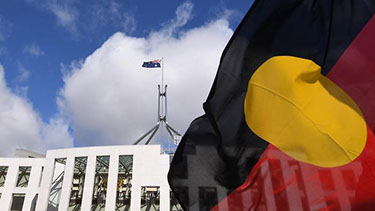 The National Aboriginal and Torres Strait Islander Catholic Council (NATSICC) is made up of members that work on the ground level in our communities, serving in faith and embodying the core tenants of our beliefs – mutual respect, equity and love for one another. Catholic Faith and Culture call us to reach out to those in need and strive for justice and peace. It is from this place that we are proud to provide our Submission regarding the recently released co-design models for a Voice to Parliament.
The National Aboriginal and Torres Strait Islander Catholic Council (NATSICC) is made up of members that work on the ground level in our communities, serving in faith and embodying the core tenants of our beliefs – mutual respect, equity and love for one another. Catholic Faith and Culture call us to reach out to those in need and strive for justice and peace. It is from this place that we are proud to provide our Submission regarding the recently released co-design models for a Voice to Parliament.
We make this Submission from our own hearts and from within the limitations of our Constitutional and Parliamentary knowledge.
We are called to support our Aboriginal and Torres Strait Islander Brothers and Sisters that came together from the 23-26 May 2017 at Uluru. They provided a roadmap to the Australian Government directly from the hearts and minds of Australia’s First People. We place our trust in their efforts – something the Australian Government has so far failed to do – and echo their following recommendations:
1. The Government must honour its election commitment to a Referendum once a model for the Voice has been settled;
2. Enabling legislation for the Voice must be passed after a Referendum has been held in the next term of Parliament;
3. The membership model for the National Voice must ensure previously unheard Aboriginal and Torres Strait Islander people have the same chance of being selected as established leadership figures.
The logistical complexities of the Co-Design process and the associated legal and governmental terminology has meant that many of the stakeholders with which we have consulted have felt distanced from the process. NATSICC acknowledges that these complexities are necessitated by the nature of the proposals and the need for any decisions to be constitutionally sound. Resultantly, we found that several of the communities with which we consulted were not fully engaged with the process. We also acknowledge the work of those that have provided the co-design process for discussion.
Many people have stated that they need to see the ways in which any Voice to Parliament will help ensure that they have food for tomorrow or that their young son or daughter will make it home safely that day. This sentiment is a strong statement in and of itself and needs to be at the heart of any design and proposal. Will the process build the capacity of Aboriginal and Torres Strait Islander Peoples to achieve self-determination? Will this design empower people to share their thoughts? Will this proposal help people live longer and happier, fulfilled lives?" All these are simple questions with difficult answers.
In 1986, then Pope St John Paul travelled to Alice Springs to meet with and address Aboriginal and Torres Strait Islander Peoples. Just under 500 kms away from the birthplace of the Uluru Statement from the Heart, he challenged the Catholic Church, and by extension Australia as a whole, when he said:
‘You are part of Australia and Australia is part of you. And the Church herself in Australia will not be fully the Church that Jesus wants her to be until you have made your contribution to her life and until that contribution has been joyfully received by others.’
St John Paul II’s words lifted the hearts of all those people who assembled in Blatherskite Park that day because he acknowledged the rightful place of Australia’s First Peoples in this Country. He signaled that the responsibility for effective dialogue and conversation lies with both the voice and the listener and openly challenged those in decision making positions to accept and receive our contributions. Thirty five years later we are making that very same argument. Historically, Aboriginal and Torres Strait Islander voices have been consistently loud, but despite the volume, very few people seemed to be receptive. NATSICC calls on the Parliament to be receptive to our new voice.
Regardless of the arrangement and componentry of the Voice, mechanisms need to be put in place to ensure that the voices of our people are heard. We will even forgo the ‘joyfully’ referred to by St John Paul II and will instead accept respectfully, attentively, and genuinely.
Subsidiarity, a core principle of Catholic Social Justice teachings, acknowledges that those closest to an issue are best equipped to address and understand that issue. Aboriginal and Torres Strait Islander led organisations are working tirelessly in every State and Territory to improve the lives of our people. These groups must be utilised by the Voice on both National and Regional models to inform the decision-making processes. Clear avenues for discussion and input into decisions by the organisations and people involved directly in communities should form a key component of the Voice. To further the application of Subsidiarity, the membership of the Voice should be considered against a selection criteria that is focused on life experience, cultural knowledge and a commitment to social justice in this Country rather than purely academic achievements.
Key points to summarise:
• The outcomes of any design or process must be a tangible improvement to the lives of Australia’s First Peoples
• The Parliament needs to make a commitment that the Voice to Parliament be heard
• The Voice must be empowered by legislation to protect their independence and ability to speak truthfully and strongly on issues
• We believe that people in Australia have good hearts and that we need to appeal to the National sense of giving everyone a fair go to ensure that the Referendum is passed
• Existing organisations should be utilised to inform the Voice
• The membership of the Voice should be considered against a selection criteria that is focused on life experience, cultural knowledge and a commitment to social justice in this country rather than purely academic achievements.
As Aboriginal and Torres Strait Islander Peoples and Catholics we place our Faith in the inherent good of the Australian people to make an informed and compassionate decision when the time for the referendum arrives.
We call for the Uluru Statement to become the foundational document that its authors intended, and we call for a commitment from the Australian Government to listen to our Voice and in turn ensure that Australia becomes the country that we all want her to be.
Emerging as a more equitable and caring Nation after COVID-19
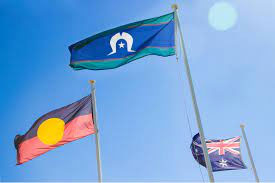 Whilst we should be talking about these things all year, Australia Day is often the trigger for discussions around moving the date, what our Country stands for or changing the National Anthem.
Whilst we should be talking about these things all year, Australia Day is often the trigger for discussions around moving the date, what our Country stands for or changing the National Anthem.
For the record:
- Yes, we should change the date to May 27 (the day that Australia voted to grant citizenship to us Aboriginal and Torres Strait Islander Peoples and to remove us from under the Fauna and Flora Act in 1967),
- Australia should stand for equality, respect, and compassion for all and,
- Yes, the National Anthem should be representative of all.
This year is different. As we approach Australia Day 2021, in addition to the questions above, we find ourselves pondering whether Australia will ever be the same after COVID-19. However, it might be more useful to consider whether we should arise from the pandemic the same after COVID-19?
With COVID-19 a continuing threat across the world, the following words of St John Paul II to Aboriginal and Torres Strait Islander Peoples in Alice Springs 1986 may never be more timely nor resonate more strongly for all Australians:
“If you stay closely united, you are like a tree standing in the middle of a bushfire sweeping through the timber. The leaves are scorched and the tough bark is scarred and burned; but inside the tree the sap is still flowing, and under the ground the roots are still strong. Like that tree you have endured the flames, and you still have the power to be reborn. The time for this rebirth is now!’
We indeed are scorched and damaged, but we are still here, and we are still strong. What lessons can be taken from the pandemic, and our response to positively shape our collective morality, legislation and perspective towards others?
1. After suffering together through the pandemic, Australians should forge forwards with humble hearts and a unity of mind and armed with a renewed sense of equality and care for one another.
Amid an unmitigated global disaster, we were compelled to come together (metaphorically - certainly not physically) to protect ourselves, our friends, our loved ones and importantly others in society. We were like the trees that St John Paul II referred to – standing together amongst a sweeping bushfire. No one was immune as the COVID-19 virus spread across Australia. International news broadcasts chronicled the indiscriminate march of the pandemic across the world and made it clear that the postcode in which you live, the balance of your bank account and the language that you speak are all peripheral. We were and are one as a global community, united by our human vulnerabilities and our reliance upon one another for the greater good.
COVID-19 - a disaster that resulted in an incomprehensible loss of life across the world – showed us that we need to begin to grasp and consider the challenges experienced by others to ensure better outcomes for all. Further, understanding that we need to care for those in vastly different situations meant that we all had a better chance of surviving the pandemic. Peter, in his First Letter to a marginalised Church, said, “Finally, all of you, have unity of mind, sympathy, brotherly love, a tender heart, and a humble mind”(1Peter 3:8). For 10 months we have successfully united to fight a common enemy, we need now to unite in love for one another to fight the enemies of hatred and injustice.
We need to see everyone in this Country for what they are - as a brother or sister in Christ. Peeling back the layers, we share more similarities than differences. We are one and need to ‘rebuild’ on a foundation of unity, honesty, and care for one another. Let us tell our young people the truth about the history of our Country so that we can begin to heal and emerge as a better society.
2. Continue to empower and acknowledge the dignity and worth of individuals, created equally in the image of God, through the extension of assistance schemes and the provision of a living wage.
Just as Aboriginal and Torres Strait Islander Culture values and utilises the skills, gifts and experiences of individuals, a pillar of Catholic Social Teaching is recognising that each person possesses an inherent and immeasurable worth and dignity. Further, we, as Catholics have a responsibility to maintain and nurture that worth.
Via the JobKeeper/JobSeeker initiatives, the Government provided *most people a living stipend. An individual’s worth to society was decoupled from the dollar and provided them with an opportunity to provide for themselves and their families without a series of dehumanising and demoralising stipulations.
(*most: Migrants and Refugees on Temporary Protection Visas were excluded from both the JobKeeper and JobSeeker schemes. In May 2020 NATSICC joined 50 other Catholic Organisations and wrote to the Prime Minister, Scott Morrison, pleading for help on behalf of the ones we saw as being abandoned during the COVID-19 pandemic)
An unexpected benefit was that the payments eased the load on community-based charities, many of whom experienced a marked decrease in requests for food and other necessities. People were provided with the resources to provide for themselves and their families, and charities were able to refocus their efforts on proactive and preventative programs.
By providing broadened and accessible financial assistance packages to those in need, the stigma around helping the less fortunate was subsequently eroded as we were forced to think outside of our own bubble. Suddenly the possibility of needing assistance was very real to all and layers of emotional insulation were pared back by the realisation that ‘it could happen to me’. We were all in the same boat, floating along the same river and lacking control over the destination.
The ANU Centre for Social Research and Methods estimated that the JobKeeper/JobSeeker Schemes lowered the number of people in poverty by 32%. Importantly it found that the additional support also flattened out poverty across the wealth spectrum with only modestly lower poverty in higher wealth households compared to lower wealth households. The resultant redistribution of wealth is something to which we should aspire. We are reminded of the words of John the Baptist - “Whoever has two tunics is to share with him who has none, and whoever has food is to do likewise”(Luke 3:10-11).
3. All Australians should acknowledge, in our actions and in legislation, that Elders/Old People are valuable and contributing members of society and that we are responsible to care for and love them – just as they did for us.
Major COVID-19 outbreaks and loss of life in Aged Care Facilities triggered lockdowns and restrictions across Australia. With the passing of our Elders / Old people, we also lost their stories and their knowledge. The term ‘Old People’ is used in the Torres Strait Islands (and some Aboriginal Communities) in the same way that ‘Elder’ is used in Aboriginal Culture – and it is how we express and show our love, respect and reverence for those that cared for us and guided us through our youth.
Although we lamented our inability to visit our Elders/Old People, we adhered to the rules to keep them safe. Newborns were presented to matriarchs and patriarchs via Zoom or introduced at a distance and through the safety and separation of windowpanes.
Our Aboriginal and Torres Strait Islander Communities, supported by State and Territory Governments, closed their borders to all but essential workers to protect our Elders/Old People and Custodians of Culture and Knowledge. Early action prevented the virus from ravaging our people who are already suffering from poor health, and in many areas a lack of healthcare facilities and resources.
We all placed an emphasis on ensuring the safety of our old people.
As we move into a time where Euthanasia / Voluntary Assisted Dying (VAD) is being debated and potentially legislated in Parliaments across the Country, we want the same level of compassion and care for our Elders / Old People that we strived to employ during COVID-19 to be applied post COVID-19. Culturally, First Nations People are conditioned and taught to cherish our Elders and Old People. We are horrified at the concept that those most at risk – the Elderly, the poor, the sick – are somehow seen as less valuable and a burden on Society. Catholic Social Teaching again echoes this sentiment, and we are all called to cherish, protect, and serve those in most need – “Bear one another's burdens, and so fulfill the law of Christ (Galatians 6:2).”
Rather than legislate the ability to end the lives of those at the end stages of their lives, NATSICC advocates the need for more advanced, compassionate, and authentic Palliative Care that considers not only physical wellbeing, but also spiritual wellbeing. In 2020 we displayed our love for our Elders and Old People and their inherent value to us as a Society by the measures we put in place to protect them. It is concerning to us that VAD sends a very different message to our Elders and Old People, a message that might be construed as their lives being a burden for others. Bishop Tim Harris, (Bishop of Townsville) in his November 2019 Homily articulates this well:
“I further fear that the elderly and frail and people with disabilities and other chronic conditions may feel pressured to prematurely end their lives. Who would have thought such a possibility has been raised, but I am afraid when society provides a ‘way out’ – a quick death – then anything is possible.”
On average, our Aboriginal and Torres Strait Islander Elders / Old People die earlier than non-Indigenous Australians and we need to ensure that improved and Culturally informed health outcomes remain a priority of Federal and State and Territory health providers. In 2021 and beyond, Australia will be a better place if we embrace our old people, love them, seek out their knowledge and stories and thank them for toil of their youth by providing them with every opportunity to contribute and experience the continuing journey of their lives.
4. Aboriginal and Torres Strait Islander gifts, skills, and knowledge to be utilised for the betterment of First Nations Peoples and Australia as a whole.
The Blackdog Institute’s Mental Health Ramifications of COVID-19: The Australian context states that between 25-33% of the community experiences high levels of anxiety, stress, worry, anger, and uncertainty during pandemics. Many of these symptoms may be attributable to isolation, financial uncertainty, concern for self and family, diminishment of self-worth due to unemployment and loss of hope.
As a contemporary Western Society, it is time to realise and acknowledge that Aboriginal and Torres Strait Islander Peoples have experienced these same symptoms (due to a very different cause), not for months, but for generation after generation since colonisation. The associated and subsequent outcomes are evident in all socio-economic and health metrics experienced by Australia’s First Nations Peoples. Through all these struggles, and against all odds, we have maintained our systems of kinship, our relationship with the land and some of our languages to remain the oldest continuing Culture in the world.
Our gifts of acceptance, tenacity, perseverance, and faith in a Greater Being are what we want to share with Australia and what we want Australians to embrace. These attributes are evident in every line of the Uluru Statement; they are embedded in the very fibre of Community-led Organisations that support Aboriginal and Torres Strait Islander Peoples and are evident when we conduct Cross cultural learning to help others better understand our point of view.
In times of struggle, we have always come together to cry, laugh, explain, and console. Our burdens are shared throughout our Communities and our unique extended families.
As we enter 2021 with a sense of hope and ‘rebirth’ we ask that, for the first time in post-colonial history, Australians stand together to lift one another up. Stand alongside the Traditional Custodian. Stand alongside the migrant striving for a better life. Stand alongside the grandmother that has lived through so much. We are much stronger, and much better when we are together.
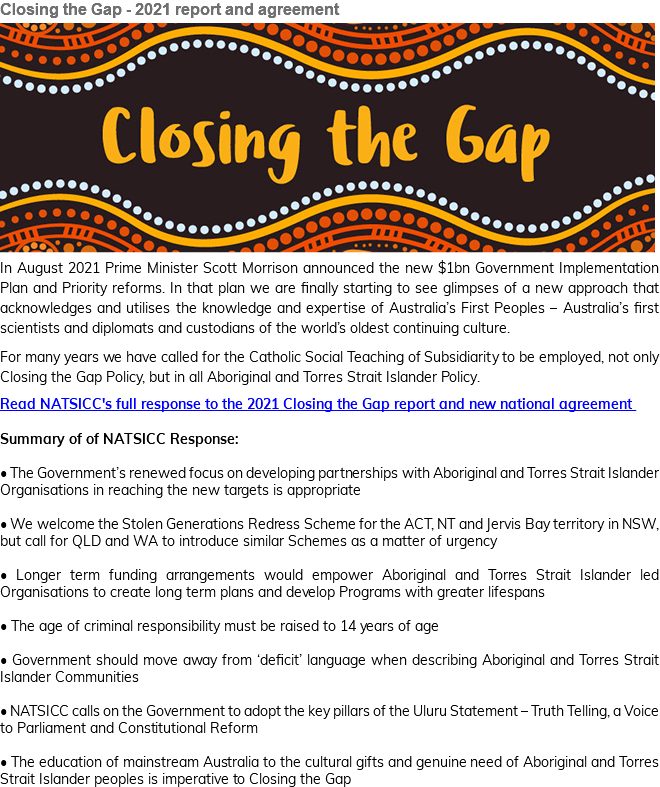
Summary of Statement
• The Government’s renewed focus on developing partnerships with Aboriginal and Torres Strait Islander Organisations in reaching the new targets is appropriate
• We welcome the Stolen Generations Redress Scheme for the ACT, NT and Jervis Bay territory in NSW, but call for QLD and WA to introduce similar Schemes as a matter of urgency
• Longer term funding arrangements would empower Aboriginal and Torres Strait Islander led Organisations to create long term plans and develop Programs with greater lifespans
• The age of criminal responsibility must be raised to 14 years of age
• Government should move away from ‘deficit’ language when describing Aboriginal and Torres Strait Islander Communities
• NATSICC calls on the Government to adopt the key pillars of the Uluru Statement – Truth Telling, a Voice to Parliament and Constitutional Reform
• The education of mainstream Australia to the cultural gifts and genuine need of Aboriginal and Torres Strait Islander peoples is imperative to Closing the Gap
Summary of Statement
• The Government’s renewed focus on developing partnerships with Aboriginal and Torres Strait Islander Organisations in reaching the new targets is appropriate
• We welcome the Stolen Generations Redress Scheme for the ACT, NT and Jervis Bay territory in NSW, but call for QLD and WA to introduce similar Schemes as a matter of urgency
• Longer term funding arrangements would empower Aboriginal and Torres Strait Islander led Organisations to create long term plans and develop Programs with greater lifespans
• The age of criminal responsibility must be raised to 14 years of age
• Government should move away from ‘deficit’ language when describing Aboriginal and Torres Strait Islander Communities
• NATSICC calls on the Government to adopt the key pillars of the Uluru Statement – Truth Telling, a Voice to Parliament and Constitutional Reform
• The education of mainstream Australia to the cultural gifts and genuine need of Aboriginal and Torres Strait Islander peoples is imperative to Closing the Gap
Australia Day 2022 - Respect. Reflect. Celebrate. Do.
Australia Day is complicated for many First Australians, and we have a long way to go before all Australians feel comfortable celebrating Australia Day on January 26, or indeed at all. Many Aboriginal and Torres Strait Islander Peoples feel that moving the date would be a starting point for creating a new dialogue and platform for Reconciliation.
The National Aboriginal and Torres Strait Islander Catholic Council is in agreement and advocates that Australia Day should be celebrated on May 27 – the day in 1967 that Australians voted overwhelmingly to amend the Constitution to allow the Commonwealth to make laws for Aboriginal people and include them in the Census. In any case, our national day provides an opportunity to come together (COVID permitting) and acknowledge the gifts that our Creator has bestowed upon us in this Great Southern Land.
The theme for this year’s January 26 Australia Day celebrations – Reflect. Respect. Celebrate. – is short in length, but large on ideology. A natural response might be to approach the theme from a collective point of view and Reflect about the ways in which we, as a community, responded to the COVID pandemic; how we as a society Respect all Australians, including our Aboriginal and Torres Strait Islander history and Peoples; and how we, as a nation, might best Celebrate Australia Day. After all, hasn’t the unofficial catchcry of the pandemic been that “we are all in this together”?
What if, for this year, you were to reframe your responses to the theme as an individual and as a Catholic?
Reflect –
How did I respond to the COVID pandemic? Was I empathetic and thoughtful towards others? Did I see a need and act upon it? Have I tried to include and support Aboriginal and Torres Strait Islander Peoples in my personal, parish or professional life?
As First Nations Catholics, it is important to reflect upon the past – even though much was taken from us, we can reflect on our determination, our resilience, and our connection to our land. You might reflect upon how important it is to come together to be one again – our strength, our love and our connections to each other and to our forebears, our learning of who we were meant to be and who we are today.
Respect -
Do I show my respect for First Nations Peoples? Have I encouraged my parish and school to conduct acknowledgements or install an acknowledgement plaque? Do I seek knowledge from Aboriginal and Torres Strait Islander Peoples in caring for our land?
Aboriginal and Torres Strait Islander Catholics show respect through honouring our ancestors and by keeping our Culture, the world’s oldest continuing Culture, alive. We respect and appreciate the non-indigenous people that are working to support our communities.
Celebrate -
How do I celebrate the survival of the world’s oldest continuing Culture? Will I celebrate Australia Day with Aboriginal and Torres Strait Islander Peoples? Will I seek out Australia’s First Peoples and listen and learn from them? Where will I attend the Aboriginal and Torres Strait Islander Sunday celebrations?
NATSICC will celebrate the amazing achievements of Aboriginal and Torres Strait Islander Peoples in spirituality, music, art, literature, dance, song, science etc. by continuing to introduce these gifts to the wider Australian Catholic Church.
By reflecting upon the theme on a personal level, we are assuming the responsibility for action and not leaving it to others to create change. Combined with our innate desire, as Catholics, to become more like Christ, we are individually called to action to make Australia a country that more closely reflects our Christian beliefs of equality, respect and care for our poor and vulnerable.
A nation built upon these beliefs is a strong and inclusive nation – something we all desire. However, a strong nation is built upon a strong foundation, and currently Australia’s foundations are undermined by its relationship with its First Peoples.
Therefore, we propose an addition to the theme – Reflect. Respect. Celebrate. Do. – bringing us closer to the 2022 NAIDOC theme of Getup! Stand up! Show up! Words are easy and limitless, but actions require time, effort and commitment. We ask that you make 2022 the year of “Do”.
Some things anyone can do in 2022 to strengthen Australia’s foundations by supporting Australia’s First Peoples include:
· Support and sign up to support the Uluru Statement of the Heart (https://ulurustatement.org/the-statement), which endorses truth-telling and enshrining a Voice to Parliament in the Constitution;
· Seek out your local Aboriginal and Torres Strait Islander Community to share their stories at your organisation, school or parish;
· Attend Mass at an Aboriginal and Islander Catholic Ministry. A list of these ministries can be found at https://www.natsicc.org.au/your-state--territory.html
· Install an acknowledgement plaque in a prominent place in your organisation, school or parish
· Acknowledge First Australians before Masses in your parish
· Deepen your understanding of January 26 and what it means to be Australian through the upcoming NITV and SBS programming slate, Always Was, Always Will Be. https://www.sbs.com.au/nitv/article/2022/01/12/nitv-and-sbs-invite-australia-join-them-deepening-their-understanding-january-26
· Undertake Cross Cultural Competency training to learn more about Australia’s First Peoples.
The Environment - Laudato Si’ and Querida Amazonia
Indigenous Voice to Parliament
Emerging as a better Nation following COVID
Closing the Gap - 2021 report and agreement
Australia Day 2022
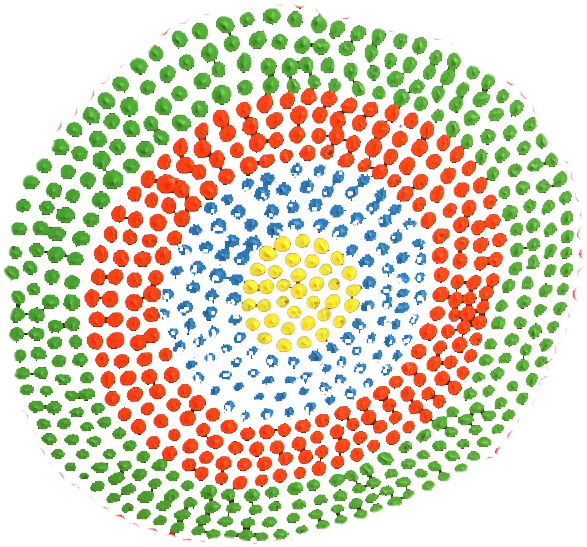
National Aboriginal and Torres Strait Islander Catholic Council
'The peak Indigenous advisory body to the Catholic Church'
80C Payneham Rd.
Stepney SA 5069
www.natsicc.org.au | craig@natsicc.org.au | 08 8363 2963
